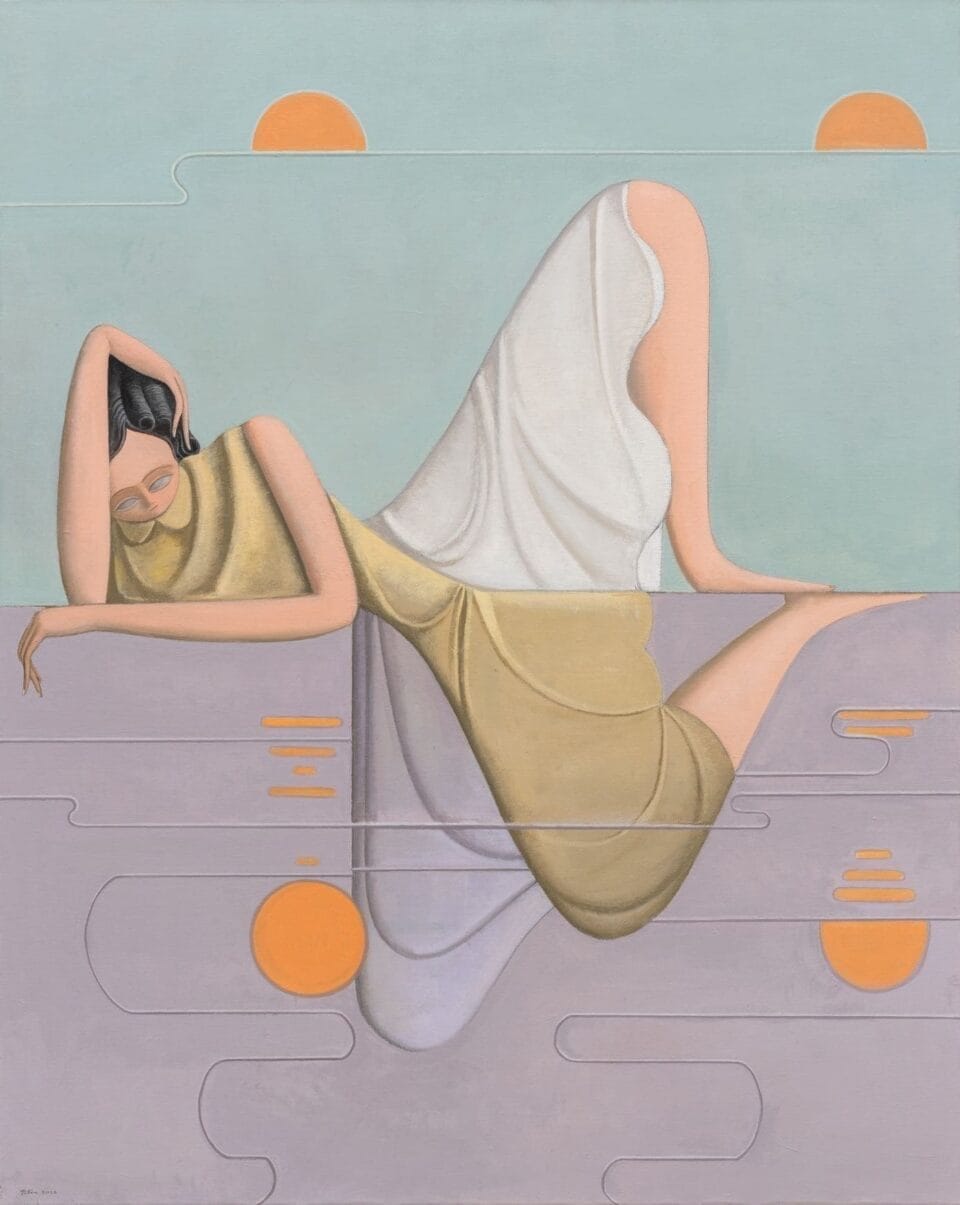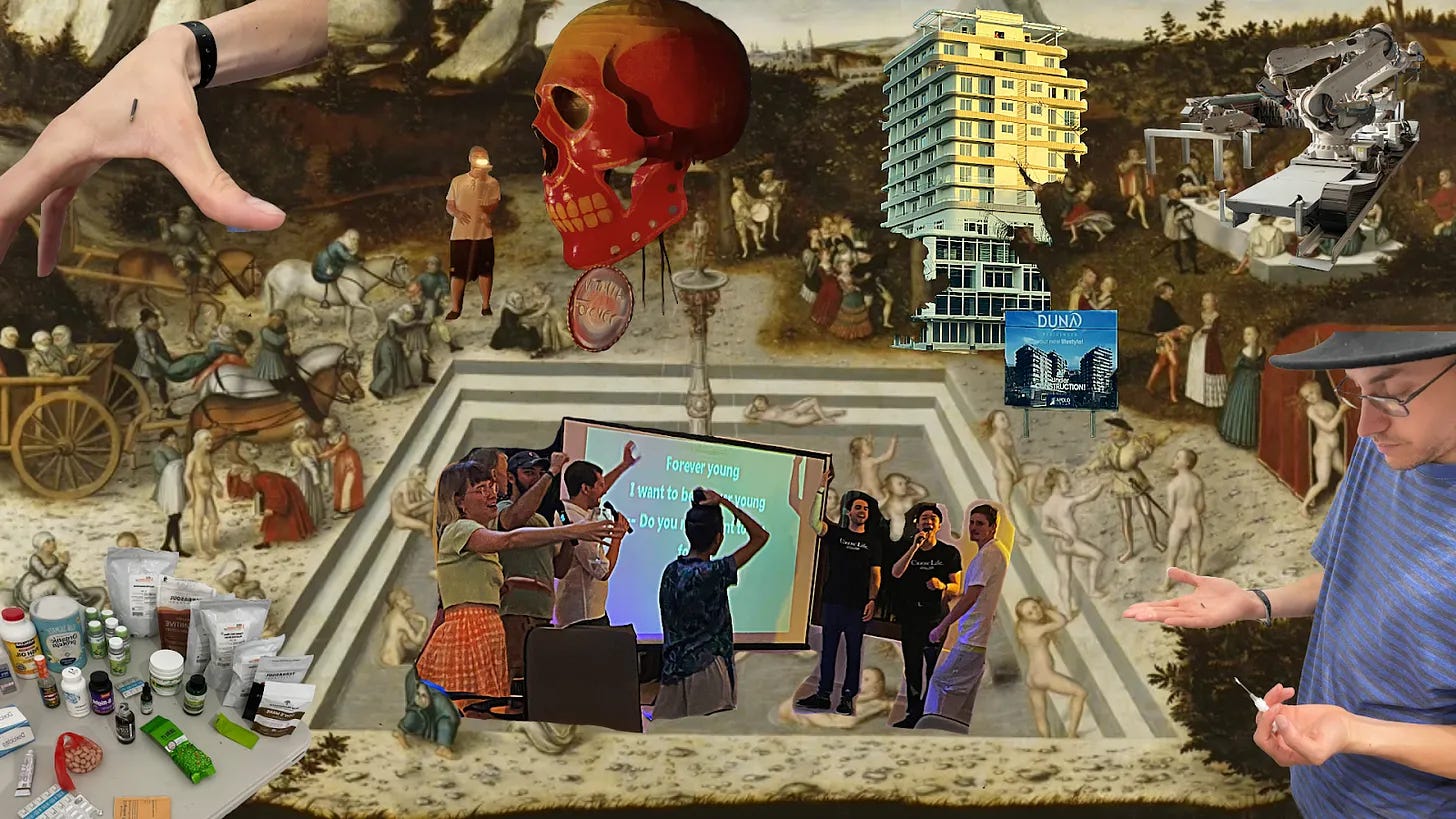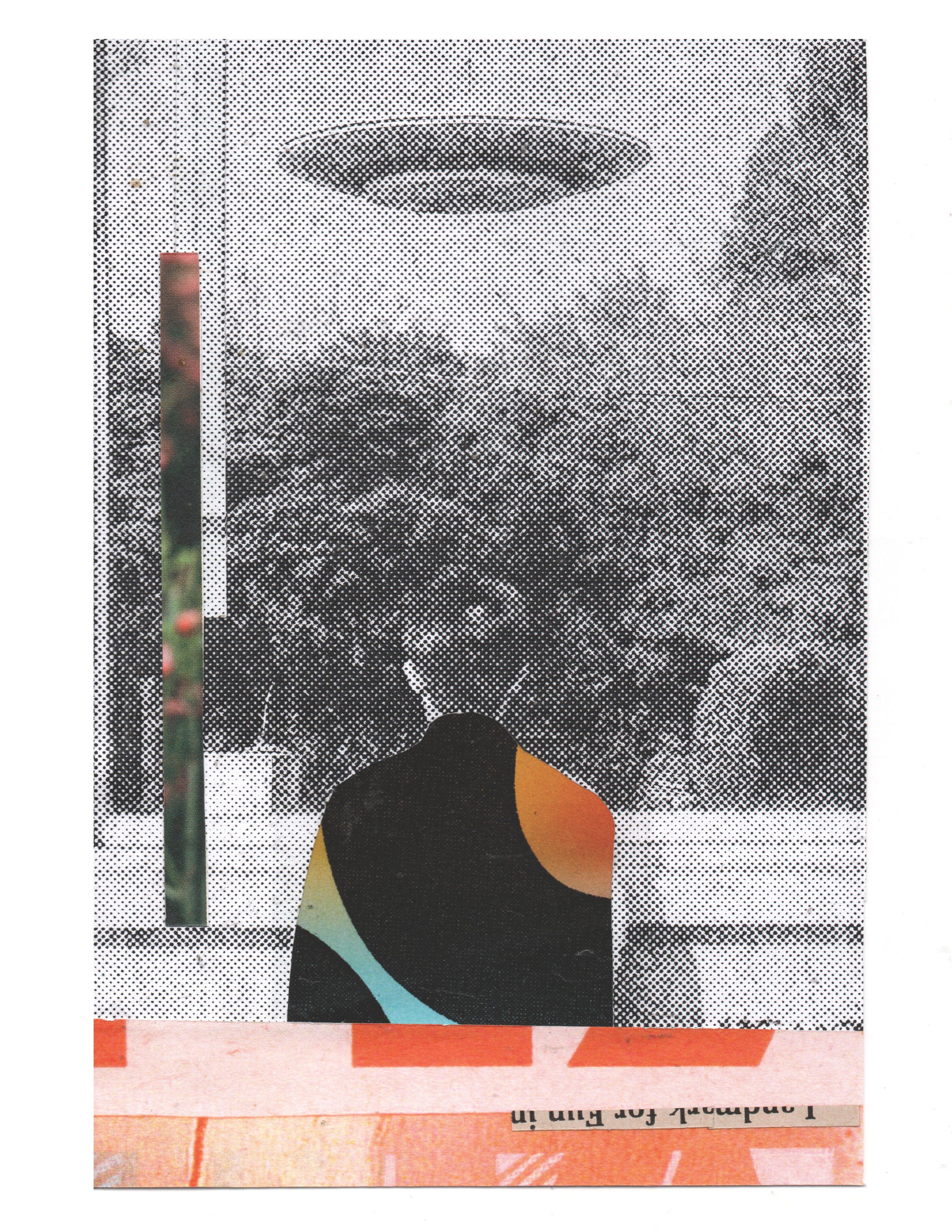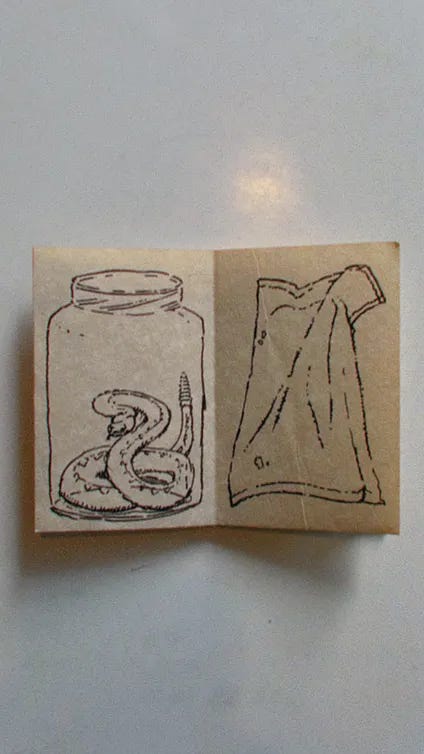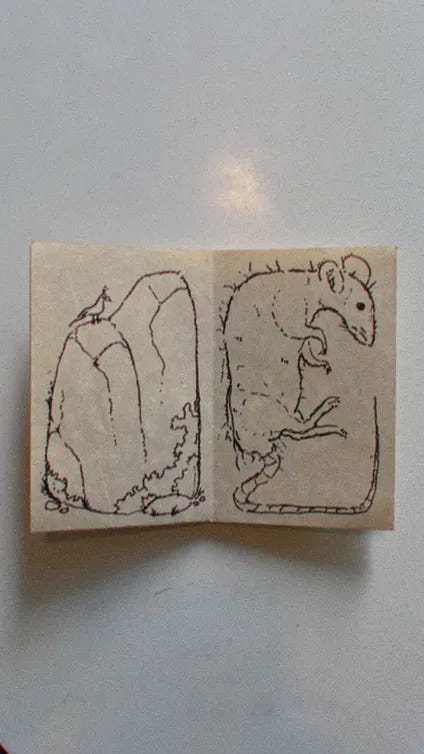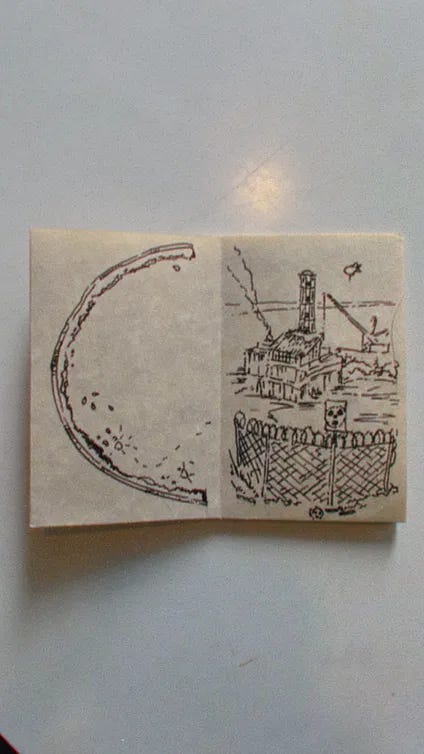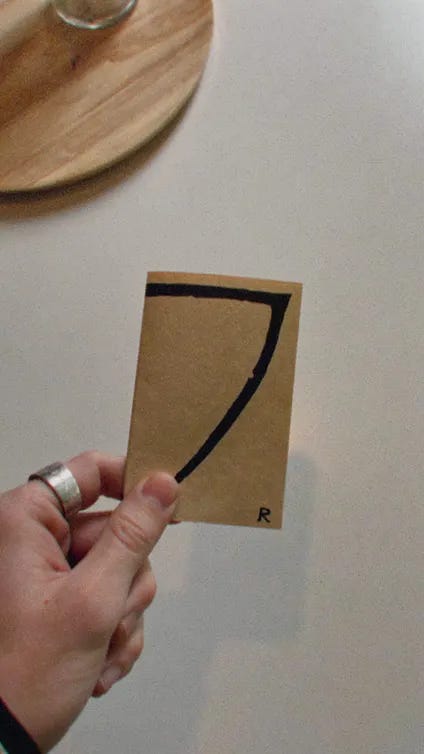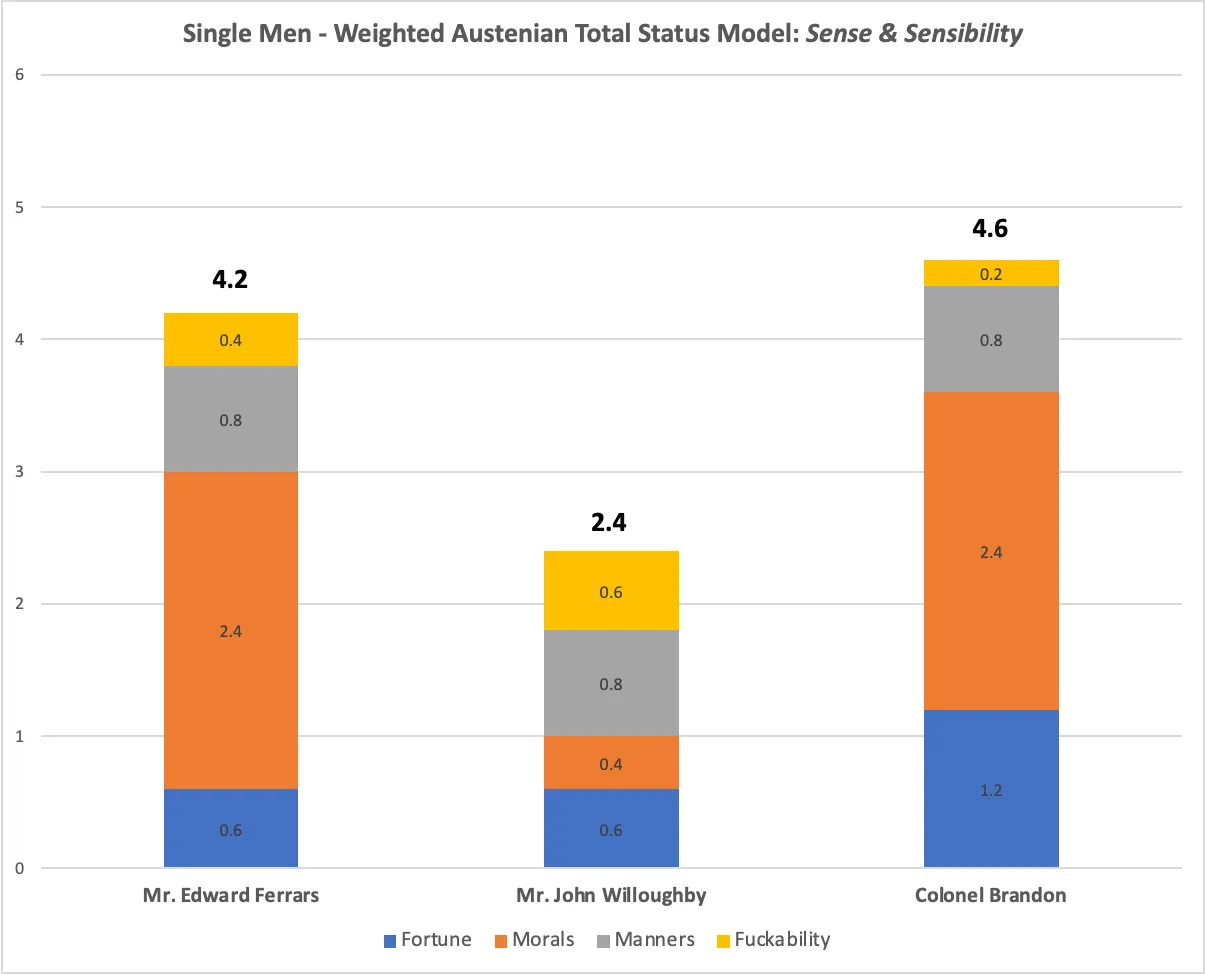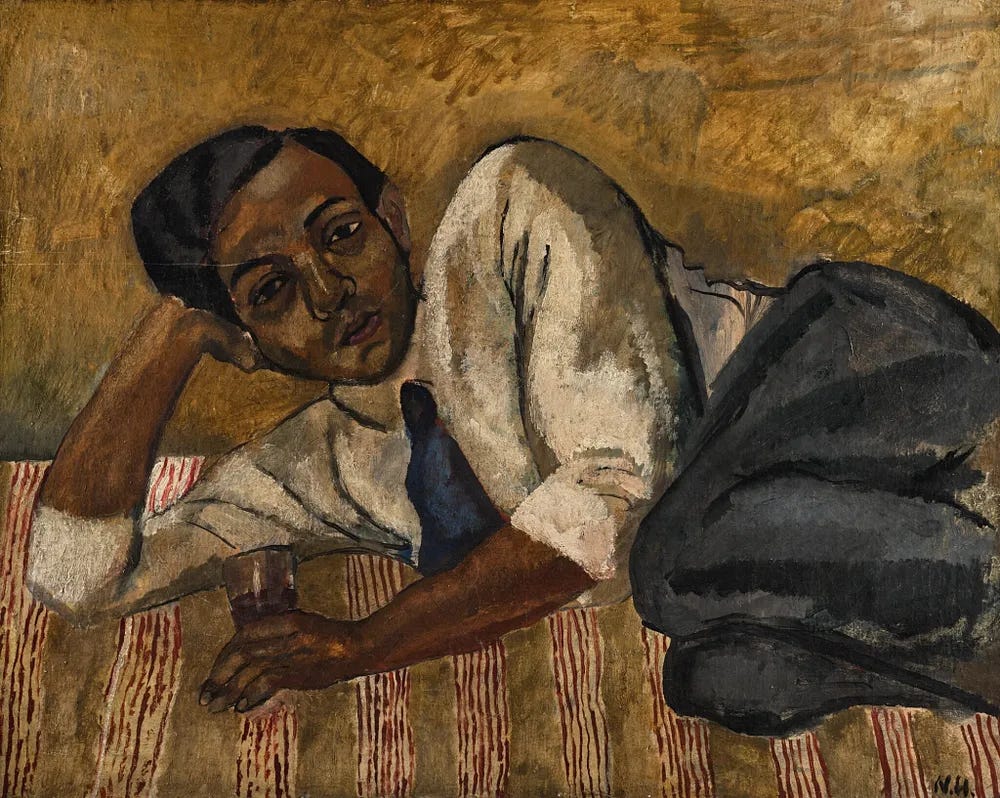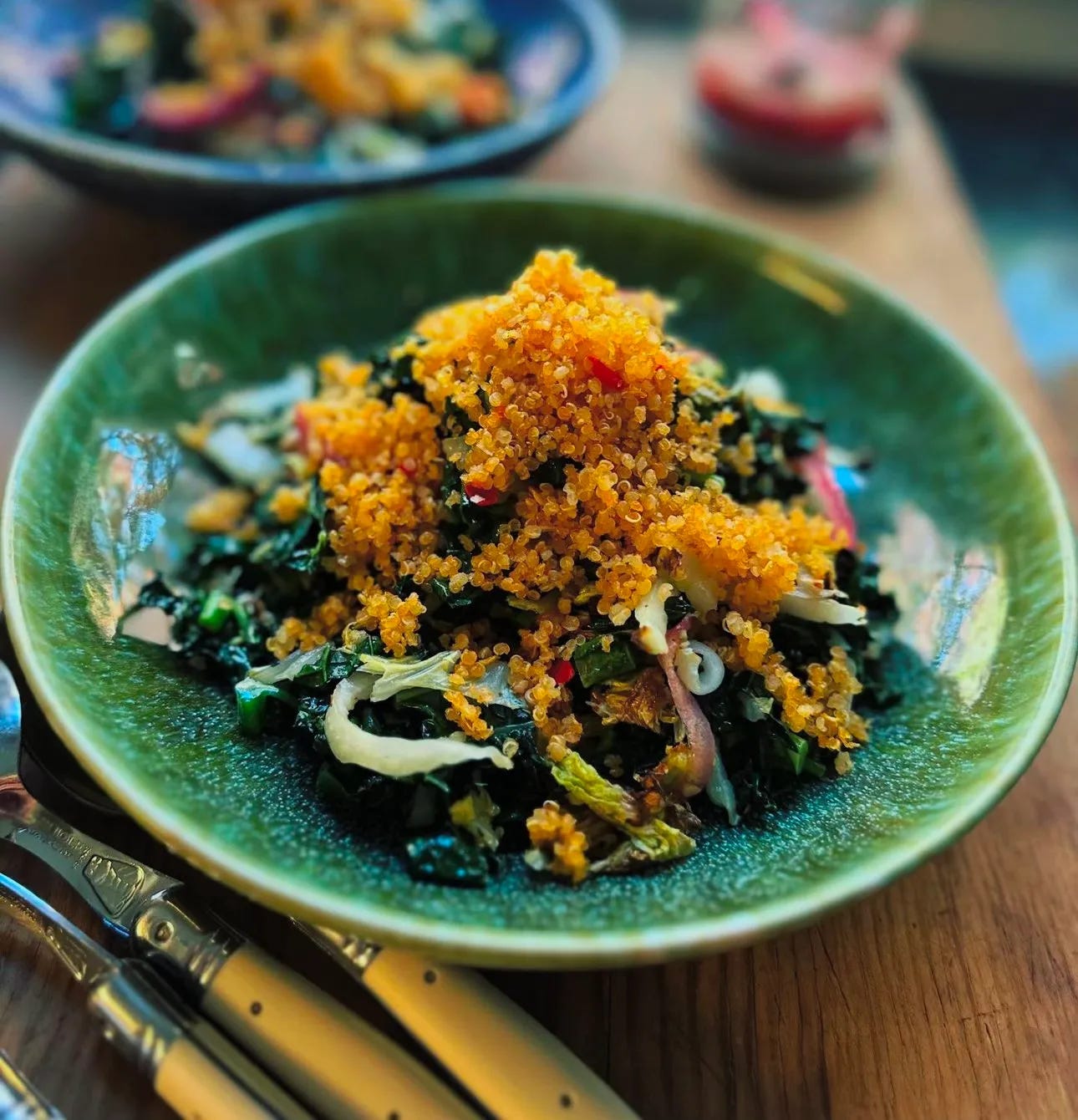This week, we’re considering the societal implications of the reactions to Luigi Mangione, enjoying the spare beauty of a December garden, learning about an island where the tech elite seek eternal life, and making a winter-friendly baked salad.
ART
Deborah Vass writes about the painting that captured her attention at an exhibit in 1993 and still holds it 30 years later: “Winter Garden” by Evelyn Dunbar.
—Deborah Vass in Still Sketching
I love December. There is a quality of light that only exists in the days leading to the winter solstice that is captured here. For as much as this painting is about a garden, it is also about those moments before dusk slips into dark, when the gardener retreats inside after a hard day’s digging, to warm against the chill. A rosy haze bathes the formal paths and lights the jagged edges of the side-edged bricks. The clouds have shifted to that particular shade of smoky blue which is reflected in the rooftops that can be glimpsed over the far hedge to the left of the garden. The beds look freshly dug and the remains of the summer crops removed, ready to rest until spring returns. There are glass cloches too, now empty, which suggests that it is predominantly a vegetable garden, and there are neatly pruned espaliered fruit trees running alongside the wall. This is a garden that is loved and orderly.
Keep reading
PAINTING
REPORTING
It sounds like science fiction: a remote island with its own laws, started by wealthy technologists, where biohackers and medical researchers seek a way to prevent death. But in this case, truth really is stranger than fiction.
—Sam Venis in Mars Review of Books
It was a clear tropical morning on the Honduran island of Roatan, and with the naked eye you could see right across the channel to the mainland, past the cruise ships and diving boats that dominate the coastline, looking out from a small city known as Coxen Hole—named for a British pirate who settled there in the 17th century to pillage the Spanish armada. The landscape may have looked like any other tropical beach hub—turquoise water and fine-grain sand surrounded by overgrown jungle and shantytowns. It’s also the site of a civilizational experiment to build a state within a state called Próspera—a special economic zone with its own trade laws and security force—that’s flooding the island with international investment, and American business-types wearing linen button-downs and ankle-high chinos. Amid the swerving motorbikes and burning garbage heaps, there’s an international airport offering direct flights from Miami, Dallas, Houston, and Atlanta, herding in tech workers with laptop jobs and wary investors seeking what they call an “exit” from American society. They have come to Honduras, and Roatan in particular, where Próspera is located, in search of what they call a new “frontier,” Galt’s Gulch in the Caribbean.
To be admitted into Próspera, you first have to be approved for entry by one of the organizations with a presence in the territory. I wouldn’t have gotten approved if not for Mark Hamalainen, a longevity educator and entrepreneur, who vouched for me with the organizers. A few days earlier, I spoke to him over Zoom. Showing up in a black muscle tee that said, “Don’t Die,” he asked me if I wanted to live forever, and I replied tentatively, “yes,” as if it were a secret passcode. The next day I was eating tacos in the Miami airport watching a Mexican chad in a crypto hoodie trade NFTs while sucking down an oversized Slurpee. I hopped on the connecting flight wondering if I was heading to the real-life island of Doctor Moreau, fantasizing about pig men and human centipedes. Just how deep did this longevity thing go, I wondered. What could go wrong in a libertarian playground on an island with no rules?
The event I’d come to observe was called Vitalia, also known as the “city of life,” a “longevity network state pop-up city” sponsored by VitaDAO, a “decentralized science” company that had recently raised $4.1 million from Pfizer. Scientific researchers and tech workers from around the world were descending on Roatan to start a “country in the cloud,” comparing nation-building to the process of building a startup. Some countries have populations of less than a million people and GDPs the size of a startup, the logic goes. Could a startup nation, founded by a tech mogul with millions of followers, eventually match those numbers? Vitalia intended to prove that it could. LARP or not, the money was real, and so were the people and the guns and the lawyers. Descending into Roatan, I started to hum that Warren Zevon song about ditching a Russian spy in Havana and hiding in the Honduran hills. “I’m a desperate man/ Send lawyers, guns and money/ The shit has hit the fan.”
Keep reading
COLLAGE
NEWS
Tina Brown: What does it say about a moment in time when the most bonding topic of national discourse is the latest murder?
Ilona Goanos: Brian Thompson, the UnitedHealth Care CEO, was gunned down outside a hotel on Sixth Avenue in midtown Manhattan last week. [...] After his death, UnitedHealth's bereavement message online was mocked by 77,000 laughing response posts.
Brianna Logan: In the five days between murder and custody, the internet was on fire with memes, Tweets, and opinions on what seemed to be an apathetic reaction from the general population. Stories of denied insurance claims and cold-hearted jokes about Brian Thompson needing to get approval for a gunshot wound seemed to be everywhere.
Annabel Ross: Even before a CCTV photo was released revealing the suspect’s disarming smile and chiselled cheekbones, the internet was cheering.
Alicia Norman: I have long advocated stating the painfully obvious and not creating unneeded elephants in rooms, so here it goes. UnitedHealthcare shooter Luigi Mangione is hot as hellfire.
Eddie Huang: Equal parts Anne Hathaway, Timothée Chalamet, and Luke Skywalker, it’s incredible that no one in a Hollywood studio thought to create him themselves.
Brendon Holder: Somewhere Ryan Murphy is rubbing his hands together and smiling at the looks of Luigi, about to cook.
Kamili: Luigi’s impact is insane. Like for once this isn’t everyone being too online, this is a real phenomenon. Like your grandmother thinks he did nothing wrong. That’s how big this is. Your coworker with 4 kids and a minivan is liking thirst tweets.
Tina Brown: The resonance of his evil actions, the sinister brilliance of his inscribed bullet casings, and the shocking way a middle-aged father of two’s brutal killing has unleashed a social media fury not at his murderer but at the health insurance industry will, I suspect, make the slaying of Brian Thompson an era-defining crime.
Camille Sojit Pejcha: I’m inclined to believe that the public sentiment surrounding the gunman is evidence not just of our desire for him but our desire for a figurehead: a modern-day folk hero who expresses our collective frustration with a broken, sometimes corrupt American health-care system. We’re fed up, disenfranchised, and sick of the status quo. And if the face of our populist rage over a corrupt industry just so happens to have a stellar jawline—well, who’s going to complain about that?
Stephen Moore: Call me crazy, but I don’t think anyone should be cheering the death of a CEO. No matter how controversial (read: scummy) their business operation is, or no matter how “sexy” the killer may be, this is not an outcome that should be celebrated.
Savannah Edwards: This man killed somebody. He murdered a man in cold blood for no reason. As far as we know, he didn’t know his victim, Brian Thompson. We haven’t seen evidence Brian Thompson inflicted personal harm on Mangione. Still, the world is celebrating this killer as if he’s the second coming or the leader of a new revolution.
Ken Klippenstein: No shit murder is bad. The jokes about the United CEO aren’t really about him; they’re about the rapacious health-care system he personified and which Americans feel deep pain and humiliation about.
Robert Evans: I know many people who suffer with chronic pain and ongoing medical issues. I will tell you that it is not uncommon in dark moments, after fruitless hours-long calls about dropped medications or receiving surprise bills, for them to joke about what they’d like to do to the executives who run these companies.
John Ganz: The first thing that struck me upon learning a little bit about the identity and background of the suspected UnitedHealth killer Luigi Mangione was that he seemed so normal.
Gurwinder: Luigi Mangione […] is a founding member of my Substack, and someone I’ve been friendly with for a while. I hope there’s been some kind of a mix-up, because this doesn’t seem like him at all.
Max Read: Mangione’s beliefs, such as we can interpret them through his social media accounts, are pretty normal for a man of his age and background; they’re not those of the median American voter, precisely, but I suspect they’re pretty close to the views of the median 20-something white male tech worker.
John Ganz: Even for the “normal” and relatively successful, something feels terribly broken and alienating. When you combine these things, you will get tragic and desperate attempts at heroism.
Alicia Norman: Luigi’s crime won’t change the health-care machine—it’s too big, too entrenched. But it’s a dark spotlight, a shock that has momentarily rattled the corporate ivory towers. And while Brian Thompson’s death doesn’t fix anything, it reflects a frustration many of us deeply feel: anger at a system that tears people down, rich-boy heroes or not.
 | | Some Guy 9d I’m sorry, but I just think it’s important to keep saying that murder is wrong so that stays a social norm. | | |
|
ILLUSTRATION
Colson Ayars’s zine—made of one sheet of paper and filled with illustrations inspired by the letter “R”—leaves us with one question: When can we expect the other 25 letters?
Keep reading
VIDEO
Jo Thompson’s note includes a lovely video of Ghislaine roses, and an investigation into the flower’s name that takes us back to World War I.

Today’s rose is pretty, elegant, multicoloured (in a good way), rambling, nearly evergreen, not too spiky, December-flowering (not what it says in the books, but every year that I’ve had her here, she’s been a wintery bloomer so far—only a few blooms in December, but a few is better than none at all), pink and peach and apricot and amber white, pastelly, fragrant.
Look at one bloom, then move your gaze around as the video moves, and look at another … and another ….. hypnotism in a flower. This short film was taken back in July, and as I look at it, I’m filled with hope for things to come, and forget for a moment the darkness and low temperatures outside.
Rosa ‘Ghislaine de Féligonde’—the name conjures up so much, and is romance itself; rose names hold so much mystery and intrigue within them. But who was ‘she’, this Ghislaine?
The story appears to have originated in the war, that a Ghislaine de Féligonde saved her husband during World War I by crossing enemy lines to pull him from a barbed-wire fence after his fellow soldiers left him to die. But the dates don’t tally, and it’s far more likely that this was some fishy marketing on the part of the rose breeder—a Monsieur Turbot.
Keep reading
LITERATURE
Even casual readers of Jane Austen’s novels know how deeply concerned they are with ideas of eligibility: determining who the most appropriate spouse is for a given character. Here, A. Natasha Joukovsky takes a crack at quantifying precisely how eligibility is calculated in Austen’s world, and how the characters of “Sense and Sensibility” stack up.
— a. natasha joukovsky in quite useless
Jane Austen, arguably the greatest novelist of all time, was the author of six marriage-plot comedies of manners published between 1811 and 1817: Sense and Sensibility, Pride and Prejudice, Emma, Mansfield Park, Northanger Abbey, and Persuasion. There is rampant dispute as to how to read them. “The people who read Austen for the romance and the people who read Austen for the sociology are both reading her correctly,” Louis Menand argues, “because Austen understands courtship as an attempt to achieve the maximum point of intersection between love and money.”
Menand’s vaguely mathematical binary is directionally accurate but insufficiently sophisticated. Austen is absolutely a marital maximizationist, but her calculations have far greater dimensional depth. As such, neither the die-hard romantics nor sociologists are reading her correctly; they are equally mistaken. Over- or under-weighting any single dimension of Austenian courtship maximization amounts to a fundamental misunderstanding of what she most cunningly gets:
Austen understood status—ahem, station; that its shoring up is hardly superficial. The intrigue of the marriage plot springs not just from uncertain affection—“will they fuck”—but the balance of such possibilities with a complex and often competing set of considerations. Status questions, basically, though to the standard socioeconomic strains I would add, particularly in Austen’s case, that of moral status. Alas, fuckability is a kind of status, too.
The Austen Math model more or less directly follows my original offhand vision, ranking all of Austen’s single men across four weighted dimensions—fortune, morals, manners, and fuckability—to develop secondary insights, calculate their individual total status, and analyze their relative marital desirability. The heroines, in turn, are judged by their dimensional weighting (and to what extent it shifts over time) versus the Austenian baseline. In other words: they are judged on the soundness of their judgment. The better a heroine is at Austen Math herself, the more virtuous she is deemed.
Keep reading
PAINTING
FOOD
Emily Nunn features a winter-friendly salad recipe from Justine Doiron’s new cookbook, describing it as “spicy, sweet, crunchy, chewy, and slightly smoky.”
—Justine Doiron, in emily nunn’s The Department of Salad: Official Bulletin
Anytime the weather dips below 50°F, it is unofficially baked salad season— the season when all my salads turn roasted and hearty. And I don’t care if my love of kale is very circa 2012, I love kale. It has heft, it has crunch, and it holds up to any heat or toppings I throw at it. This roasted kale and cabbage salad stretches between side salad and full meal, with a chili-crispy quinoa topping that adds a touch more protein. The dressing is a take on agrodolce, which is a sweet-sour Italian condiment that thrives on sturdy vegetables, so feel free to bookmark it for any other salads you plan on making throughout our coveted baked salad season.
Keep reading
Art & Photography: Michael Chesley Johnson, shannon viola, Colson, Victoria K. Walker
Video & Audio: Jo Thompson
Writing: Deborah Vass, Sam Venis, Tina Brown, Ilona Goanos, Brianna Logan , Annabel Ross, Kamili ★ , Camille Sojit Pejcha, Alicia Norman, Eddie Huang, Brendon Holder, Stephen Moore, Savannah Edwards, Ken Klippenstein, The Only Robert Evans, Gurwinder, John Ganz, Max Read, Some Guy, a. natasha joukovsky, emily nunn
Hello fellow Dogists! In this Substack, I want to build a community not only of dogs and their people, but also of questions and answers. For starters, I’ll provide the questions and you guys can provide the answers. Because this week is the first week of The Dogist Stories, I want to start at the start…
19 hours ago · 17 likes · 3 comments · The Dogist
In 1973, at the age of twenty-one, I left New York and went out to California to seek my fortune, having been accepted to the Stanford University Graduate Program. I had never seen a palm tree, or been farther west than Chicago, or heard of Stanford. I was a working-class girl who never expected to go to college, let alone become a writer. I was, howeve…
3 days ago · 82 likes · Alice Hoffman
Hello and welcome to COVEN (by Anna Marie Tendler), my new newsletter. I have decided to move my email list over to Substack as a way of creating a more thoughtful and intimate experience. COVEN will be a place to receive my thoughts and musings on life. It will be fun, conversational, and at some points silly. Perhaps you’ve read my memoir Men Have Cal…
4 days ago · 130 likes · 5 comments · AMT
Inspired by the writers featured in the Weekender? Creating your own Substack is just a few clicks away:
Start a Substack
The Weekender is a weekly roundup of writing, ideas, art, audio, and video from the world of Substack. Posts are recommended by staff and readers, and curated and edited by Alex Posey out of Substack’s headquarters in San Francisco.
Got a Substack post to recommend? Tell us about it in the comments.




